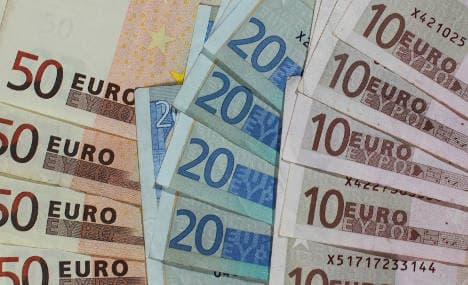Economists warn against German euro exit

While a third of Germans would rather pay with the old Deutsche mark than the euro, economists warn that a German exit from the currency union would result in a disaster.
“A German exit would be an economic and political catastrophe of the first degree, warned Holger Schmieding, the chief economist of the Berenberg Bank.
“Even a believable rumour that Germany would exit the euro would result in a massive capital flight from the countries of southern Europe to Germany.”
The southern European banking system would then collapse, bringing down entire economies with them, Schmieding said.
The consequences for Germany would be severe. The crisis countries could no longer pay back their debt and Germany’s important export markets would drop off. On top of that German taxpayers would be burdened with immense costs, he said.
In the United States taxpayers had to cough up €300 billion following the collapse of Lehman Brothers.
“It is not imaginable what would happen if we triggered a financial crisis.”
A Prognos study showed that the German economy would grow by 0.5 percent less annually if it used its own currency. That would cost the country 200,000 jobs.
On the other hand if you add up the expected growth advantages of euro membership between 2013 and 2025 there would be a profit of nearly €1.2 trillion – or about half Germany’s gross domestic product in a year.
Thomas Straubhaar of the Hamburg HWWI economic institute thinks a return to the D-mark would be “a worst possible scenario.”
“An upward valuation of the D-mark and an accompanying devaluation of the euro would result in a massive debt forgiveness of all other euro-countries – with the costs of that picked up by Germany. This could lead to a currency war and the end of monetary stability.”
Actually during the D-mark years money in Germany was not better off than it is today. The 1990s saw average inflation increases of 2.2 percent. In the 1980s the rate was 2.8 percent.
Germany’s inflation rate has dropped to a yearly average of 2.0 percent ever since the European Central Bank took over following monetary union in 2002.
The Local/DPA/mw
Comments
See Also
“A German exit would be an economic and political catastrophe of the first degree, warned Holger Schmieding, the chief economist of the Berenberg Bank.
“Even a believable rumour that Germany would exit the euro would result in a massive capital flight from the countries of southern Europe to Germany.”
The southern European banking system would then collapse, bringing down entire economies with them, Schmieding said.
The consequences for Germany would be severe. The crisis countries could no longer pay back their debt and Germany’s important export markets would drop off. On top of that German taxpayers would be burdened with immense costs, he said.
In the United States taxpayers had to cough up €300 billion following the collapse of Lehman Brothers.
“It is not imaginable what would happen if we triggered a financial crisis.”
A Prognos study showed that the German economy would grow by 0.5 percent less annually if it used its own currency. That would cost the country 200,000 jobs.
On the other hand if you add up the expected growth advantages of euro membership between 2013 and 2025 there would be a profit of nearly €1.2 trillion – or about half Germany’s gross domestic product in a year.
Thomas Straubhaar of the Hamburg HWWI economic institute thinks a return to the D-mark would be “a worst possible scenario.”
“An upward valuation of the D-mark and an accompanying devaluation of the euro would result in a massive debt forgiveness of all other euro-countries – with the costs of that picked up by Germany. This could lead to a currency war and the end of monetary stability.”
Actually during the D-mark years money in Germany was not better off than it is today. The 1990s saw average inflation increases of 2.2 percent. In the 1980s the rate was 2.8 percent.
Germany’s inflation rate has dropped to a yearly average of 2.0 percent ever since the European Central Bank took over following monetary union in 2002.
The Local/DPA/mw
Join the conversation in our comments section below. Share your own views and experience and if you have a question or suggestion for our journalists then email us at [email protected].
Please keep comments civil, constructive and on topic – and make sure to read our terms of use before getting involved.
Please log in here to leave a comment.